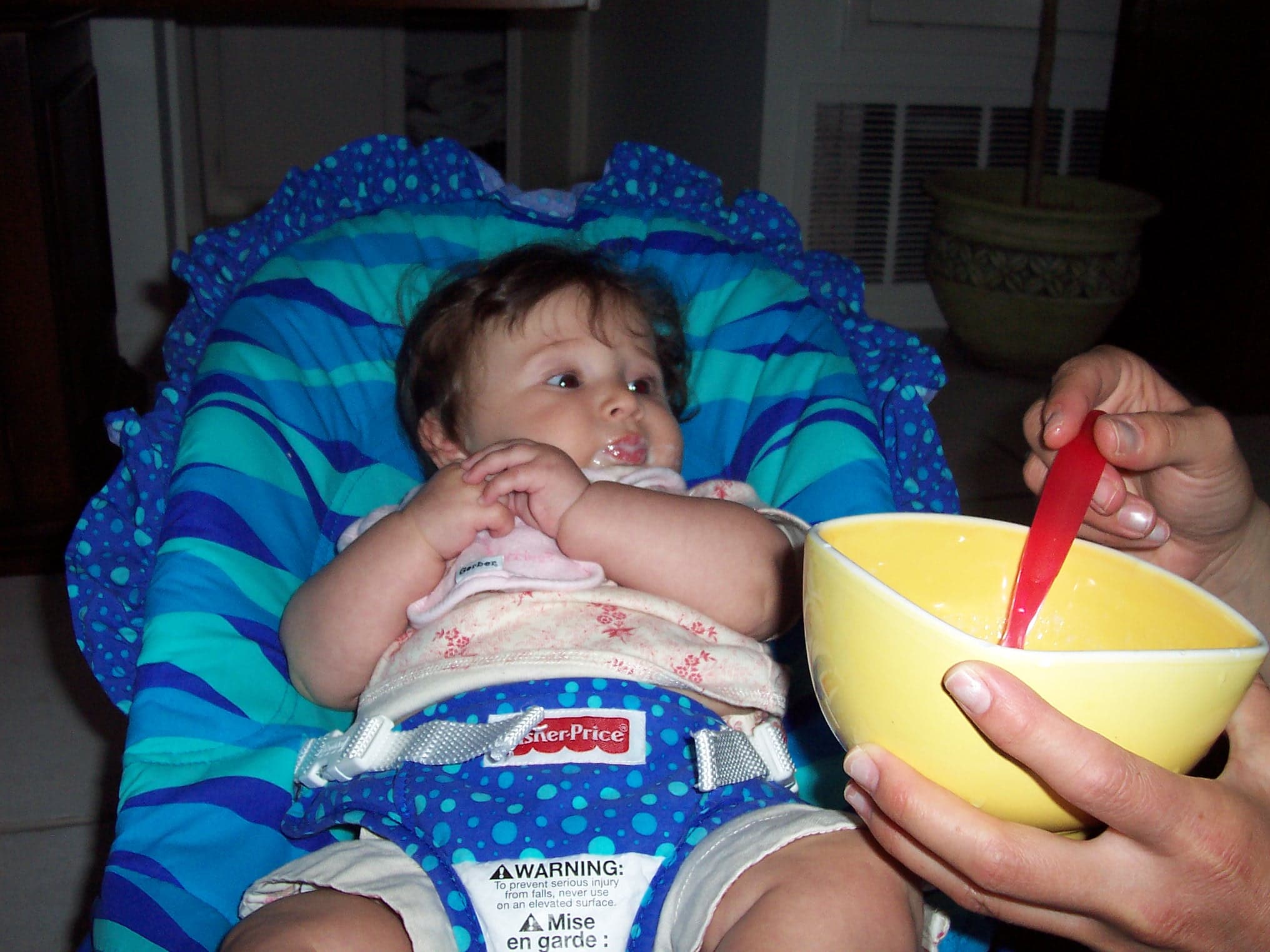SOLID FOODS
There are many reasonable ways to start feeding infants. With just a few guidelines, you should be able to relax and enjoy mealtimes with your child.
WHY DO YOU START SOLID FOODS?
The main reason you’re introducing solid foods is to increase the pleasure in your child’s life. With few exceptions you are not introducing solids because breast milk or infant formula is lacking in some important nutrient. Now, please re-read those first two sentences because you’ll spare yourself aggravation if you understand those two facts.
WHEN SHOULD YOU START SOLID FOODS?
For most families, feeding infants by introducing solids around 6 months of age is reasonable.
WHAT ARE GOOD CHOICES FOR FIRST FOODS WHEN FEEDING INFANTS?
Start feeding infants with foods high in iron because breast milk is low in iron (but easily absorbed by babies) and formula has iron that’s difficult to absorb. So, it makes sense to start with an iron fortified baby food – usually cereal in United States.
Next, you can add a new simple food (a cereal, a fruit or a vegetable – unmixed) about every 3 days. This means at any given time there is, at most, one “new” food on your child’s menu. That way if some “new” problem arises, you’ll have a good idea what “new” food may have caused that problem.
Give foods that appeal to you and that you think your child might enjoy. There’s no good rationale to support giving green vegetables before yellow, or fruits before vegetables, etc. Some parents think their children eat vegetables better if they’re offered before fruits. Others like to give fruits first because they know they can treat stooling problems with certain fruits.
Give whichever you want first. It probably won’t make much difference in the long run. There is a fair chance your child will become a “picky” eater by age 2, no matter what you do with the first foods.
On the other hand, there are reactions to certain foods that are consistent. If you’re like most parents you’ll find that bananas and apple sauce thicken the stools (or may even cause constipation) while pears, peaches, prunes, apricots and plums loosen the stools.
So, if your child has a tendency towards constipation, avoid bananas and applesauce and give pears, peaches etc.. If you want to thicken your child’s stools avoid the stool softening fruits and give more bananas and applesauce.
ARE MEATS IMPORTANT?
If you want to start meats, best to offer them after 7 or 8 months of age. Most children don’t care for meats until well past their first birthday so don’t expect much meat eating. Also, don’t expect your infant to eat any baby food meats because they taste and smell awful. Further, it is not important that a child eat a minimum of meat. Little or no meat works very well for most children.
WHEN CAN YOU GIVE “REAL” FOOD TO YOUR CHILD?
After 2 or 3 months of introducing 1 new food every 3 days you will have given about 20 different foods.
If you are like most parents, you will find that your child has no significant problem with any of those first foods. You can now start giving mixtures of food which may contain quite a few “new” dietary items. For example, you can give pizza and lasagna and enchiladas and whatever foods your family normally eats. The only two exceptions are honey and Karo Syrup.
Of course, everything has to be soft and swallow-sized for an infant. Use your fork or spoon to mash these foods.
You can give foods that contain spices and that are not especially “baby” foods. You can also give finger foods, like Cheerios at this time. This is the best time to introduce meats. You’ll have to shred the meat into baby-sized bites and you still wouldn’t expect your child to show much interest.
HOW CAN YOU BE SURE YOUR CHILD IS GETTING THE CORRECT AMOUNT OF CALORIES, PROTEIN, CALCIUM, OTHER MINERALS, FATS AND VITAMINS?
The core of your child’s nutrition will usually be breast milk or formula or, when a child’s 1 year of age, whole milk – even if they’re eating cereals, fruits, vegetables and meats.
A nursing child should nurse at least 4 times/day. A child drinking formula or milk should consume at least 20 ounces/day to ensure adequate calories, protein, calcium and most vitamins.
The quantity of starches, fruits or vegetables a child eats is not crucial. Again, the breast milk, formula or milk will usually supply the most important parts of your child’s nutrition.
As you give more solid foods, your child will decrease the amount of breast milk or formula or milk. As long as your child is nursing 4 times/day and/or drinking 20 ounces/day of formula or milk, you are probably not giving too many solids. If your child is consuming less than those minimums, decrease the solids until the fluid intake increases.
When feeding infants, you don’t have to worry about giving too few solid foods. Even if your child eats no starches, fruits, vegetables and meats but does well with fluid intake, it is unlikely to have significant nutrition problems.
With no solids it’s possible that your child could develop a mild anemia. This is low red cell counts that are easily corrected and routinely monitored in our office at the 9 month check-up. If you’re only breast-feeding beyond 6 months of age, we may choose to start a vitamin supplement for a child that’s eating no solid foods. Otherwise, you should have no problems.
MEALTIMES SHOULD BE ENJOYABLE!
Feeding infants with stressful monitoring of the number of green, yellow, or orange vegetables that your child eats (or doesn’t eat) is more likely to cause dietary problems than to help things. Remember, solid foods and meals should increase enjoyment in your child’s life. Mealtime is not the time to enforce your will upon your child.
On the other hand you are not expected to go out of your way to give junk foods. Once you are past the introductory baby food stage, you should be offering your child the kinds of (age appropriate) foods that the rest of your family eats. If your child wants some of the healthy choices you are offering, great. If your child doesn’t want some (or all) of the healthy foods you are offering, fine. Don’t worry about the foods your child doesn’t like. Just stop offering those foods you know they don’t like and offer more of the healthy foods your child enjoys.
WHEN TO SEE THE DOCTOR
You should make an appointment if your child’s core nutrition is below recommended levels even after stopping other food. You should also make an appointment if you find yourself getting aggravated about feeding infants or your child’s eating habits.


